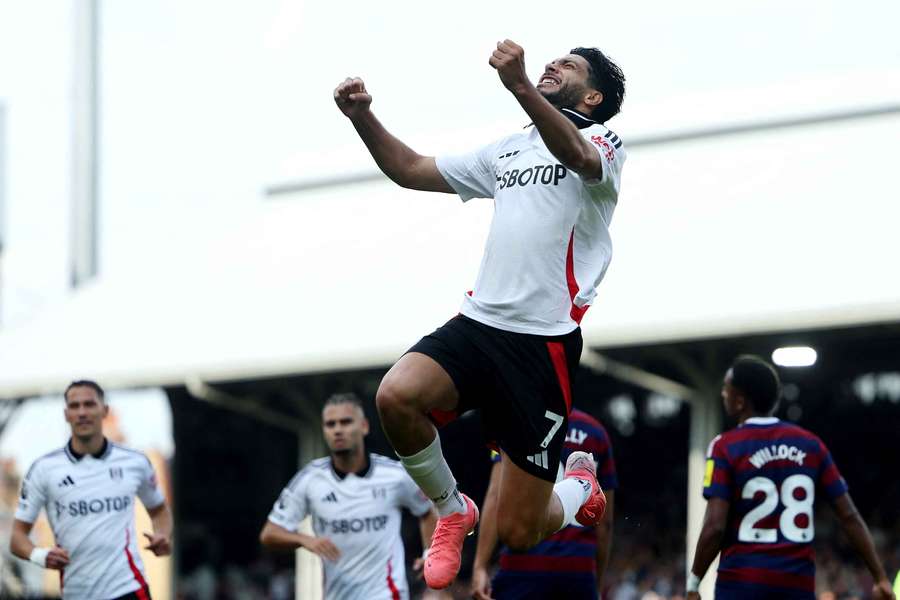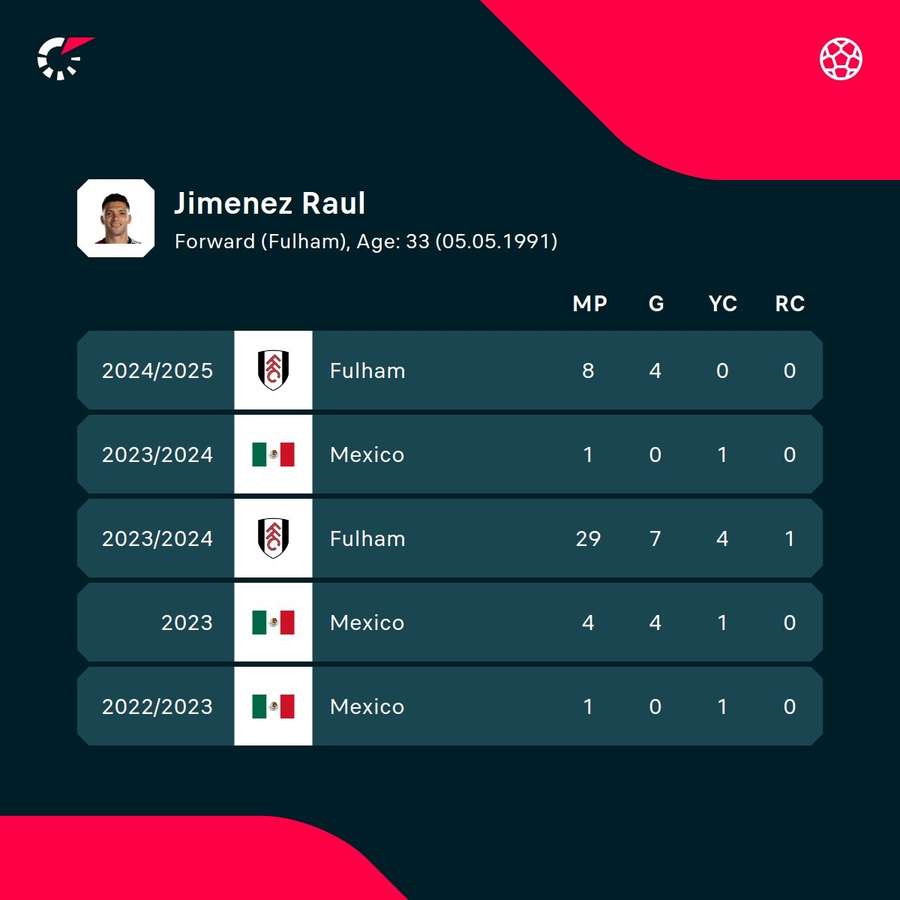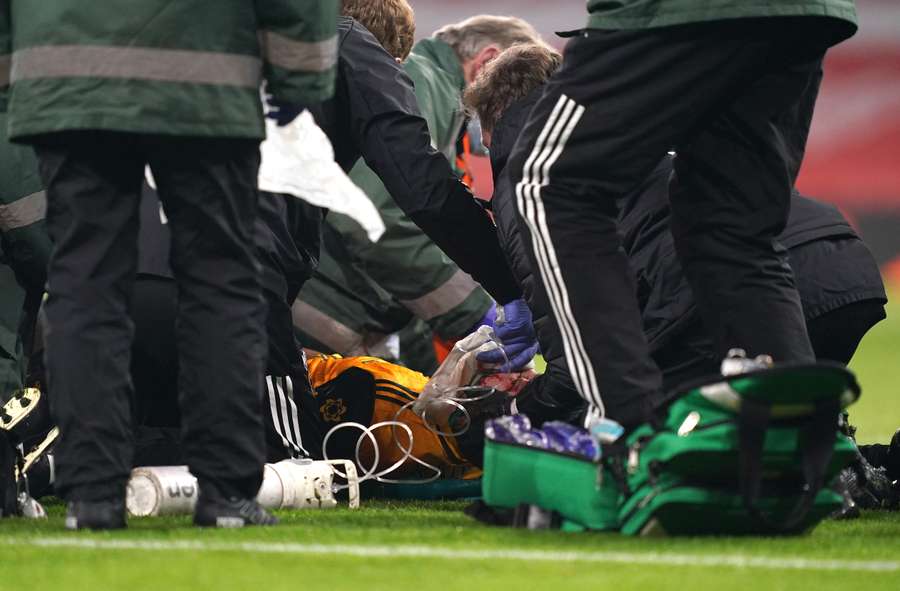Fulham's Jimenez a man reborn four years on from horror head injury

The Mexican footballer, a youth product of Club America, was already an idol on Mexican soil in the last quarter of 2020, but also for a small English town of just over 260,000 people. Jimenez knows that, for the rest of his life, he will not pay a bill for a meal in a restaurant in Wolverhampton, where his face is synonymous with happiness.
In that engineering-heavy, aerospace-labour-rich town, there is also a landscape of quiet life with its Elizabethan architecture and a stadium where a team has positioned itself as a regular Premier League outfit.
Wolverhampton, far from the pressures of the limelight of the Premier League's big teams, offered him an ideal setting similar to the one Jimenez found at Benfica in Portugal after an inconsequential year in which he succumbed to the demands of Diego Simeone at Atletico Madrid.
And, although some of the Mexican fans and press tried to make the move to Wolves look like a step backwards after just over two good years at Benfica, the striker understood that he had a once-in-a-lifetime opportunity to prove, if anyone had any doubts, that he could be the elite '9' he had always dreamed of being.

Wolverhampton: his place in the world
On August 11th 2018, Jimenez took to the pitch at Molineux Stadium for Wolves' first Premier League game of the 2018/19 season. Seeing himself dressed in yellow, as he did for so many years of his childhood at Club America, was a good omen on that eagerly awaited debut for the Mexican, who would end up thrilling the crowd after scoring in a 2-2 draw.
From that day on, Raul was loved by a fervent fan base that found in his goals a pretext to smile and to dream. Suddenly, Wolves won three consecutive games and the people of that beautiful English town began to believe they could compete for something beyond survival. And, in large part, because of the Mexican, who soon began to hear songs in his honour.
So, a month after Jimenez became Wolves' highest-scoring player in a single season in the club's history, the board quickly exercised its option to buy him and forked out 38 million euros (£31.6m) for a four-year contract, the most expensive purchase the club had made at the time. Wolves qualified for the Europa League and the Mexican was named by the fans as their player of the season.
The following campaign would be one of resounding consolidation in England for a Raul who had not had the participation he would have hoped for at the 2018 World Cup in Russia. With a thirst for glory, Jimenez ended up establishing himself as a total idol for Wolves, who experienced a dream European season.
In that tiny, picturesque place, the chants of the fans were heard with fervour as they enjoyed his goals in the Europa League, where they competed all the way to the quarter-finals. With 27 goals and memorable matches, the Mexican was voted by the crowd and his teammates as the year's best player.
In that context, Raul came into the 2020/21 season as a focal point and with a team that was beginning to build around his virtues. On his 100th game with Wolves, the Mexican signed a four-year contract extension, nipping rumours of a possible transfer in the bud. The future was looking brighter and brighter, until that fateful 29th November, when Wolves visited mighty Arsenal.
A vital turning point
Raul has said, in several newspaper interviews, that he has little recollection of what happened that night. The Mexican striker has no record of the sequence that shocked an entire country. The Queretaro native has no recollection of that corner five minutes into the match, nor of how he leapt to contest the ball in search of a goal and of the sharp collision between his head and the head of Brazilian David Luiz.
Nor does he remember the moment when he lay limp on the ground, with blood pouring from his nose and no sign of life, at the same time as the medical teams from both clubs rushed in to attend to him, amid the commotion of teammates and opponents who saw that there was not the slightest response from him, and from the Brazilian centre-back who was also bleeding, but conscious.
Within minutes, the news went viral in Mexico. It was the longest eight minutes of Raul's life. Eight minutes in which he was treated with the utmost care to be immobilised before he could be put on a stretcher with an artificial respirator.
"I knew immediately that it was a serious injury," said Matt Perry, head of the Wolves medical team, who accompanied Jimenez throughout and stayed with him when the Mexican was admitted to a London hospital emergency room, where the severity of what had happened was confirmed: a skull fracture.
When he regained consciousness, the first thing Raul did was to communicate with his wife Daniela. It was in her face that the Mexican observed, still without understanding what he was doing lying in a hospital bed, that something serious had happened. Shortly afterwards, listening to the doctors, relatives and colleagues, and watching the images, he understood that he had been close to losing his life.

It was a moment of uncertainty and deep introspection. Amid his desire to play in the 2022 World Cup in Russia, Raul realised that he needed, more than ever, to cling to his loved ones and to football, which had been his refuge since he was a child. And although in mid-December, three weeks after the event, he visited the team's training session and told his coach, Nuno Espírito Santo, that he was ready to return, the Mexican had to navigate a slow and complicated rehabilitation process.
It took months of Martha being by her son's side, helping him to read and knit to improve his neurological side, before Raul returned to the gym and training, where he became untouchable so as not to cause a relapse, until the Mexican was able to return to play a football match in July 2021, with special protection on his head. Two months later, in a match against Southampton at St. Mary's Stadium, he scored again. That scream, 300 days after what happened on the Arsenal pitch, was an emotional release.
And yet, for months, Raul was never the same. Although in his statements he said he felt confident and sure of continuing to compete at the highest level, his performances were far from those that made him a star for the club. And although his performance was not the same, his people did not abandon him and consoled him. When he had to leave, the Mexican received a standing ovation.
His next destination was Fulham. And as at Wolves, Raul found another reason to smile. With more games under his belt since the injury, and with full confidence from the club, the Mexican was back to his best. The start of this campaign has been better than expected. His goals have meant important points for the team and he has established himself as a starter.
With that hunger for glory intact and the effort of a voracious rehabilitation, his passion returned. On September 28th, Raul was once again on the scoresheet. His scream was deafening. It was his 100th goal in Europe.
Placing him on par with the legacy of Chicharito and Hugo Sanchez. An achievement worthy of his ability and resilience. The resilience he showed in his recovery.
In the time when few were with him. In the time when he was sure he was going to come back to make it clear to everyone that being born again will always be worth it.

